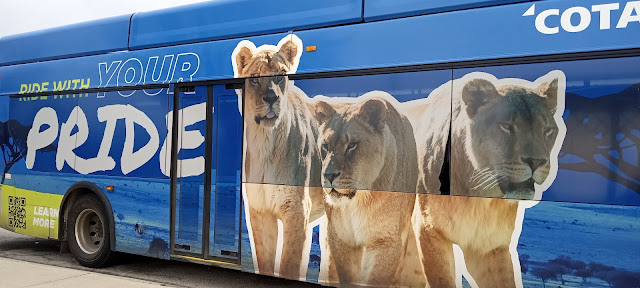Nine Months on the Bus
After the shop quoted me $1,300 just to diagnose the problem with the transmission, I decided to ditch the car and take the bus. Car registration and insurance canceled. I am free of vehicle ownership.
I’ve been a full-time bus-rider since February. I am fortunate in that I can get by on the bus system here in Columbus, OH. Not everyone can. The bus is certainly not convenient for everyone, and for those who need to be someplace at 4 in the morning, the buses simply won’t deliver.
Most people on public transit consider it sinking low and they can’t wait to get a car. It does take three times longer to get anywhere, and many areas do not have easy access to service.
I think of it this way: public transit has relieved me of the burden of vehicle ownership. If more people had that mindset—if more Americans thought of public transit as something not just for the poor or the elderly or the disabled, we might see massive change.
Automobiles do nothing but break down and cost money, and we are in an era where you can’t do most of the work yourself. Cars are too computerized, and they are designed to need special equipment to service them.
If we want to reduce carbon emissions, public transit is the way to go. If we want to reduce traffic, taking vehicles off the road is the only way. That should be the goal of city-planners and public transportation in general. You can’t keep adding lanes—no matter how many you pave, on-ramps and off-ramps will always be one lane and on one side of the expressway, causing congestion, so the solution is fewer cars on the road.
I’m all for public transportation. More rail. More buses. Let’s get the USA off its addiction to cars. It should be clear by now that not everyone in the country can own a car. There simply aren’t enough lanes to accommodate every single individual person owning their own transportation device, so let’s admit we need to make transportation a public issue.
_____
Recently Columbus announced a new initiative called Link us. I’m skeptical of how much good this will actually do. I’m worried it will be a gentrification thing instead of actually improving public transit. Do we really need special buses for one stretch of road? I’d be all for dedicated bus lanes, but perhaps Columbus would be better off spending $40M building a subway, or just expanding bus service in general.
How much more efficient would mass transit be if it didn’t have to share the road with automobiles? Maybe the money could be better spent reaching more regions to increase ridership. Perhaps an automobile buyback program and an annual tax credit would reduce congestion.
Perhaps we should admit that transportation is not profitable so the burden should be shared.
The United States has a car culture, but it is not natural. It seemed like a good idea in the 1950s—rip up all our trolley systems and pave more roads—but now that we’re 50+ years into those policies, we can see the result of what happens when everyone owns a car: a traffic nightmare everywhere no matter how many lanes we add, and car companies are now trying to make our automobiles subscription-based.
Owning a vehicle is expensive. It’s a burden. As the song goes, we drive our cars to work every day / to and from work both ways / so we make just enough to pay / to drive our cars to work each day.
This is not the end of history.
Public transportation should relieve us of the burden of owning and maintaining a car. Let’s start taking cars off the road. Maybe divert some of the military money to making life better for the citizens.







Comments
Post a Comment